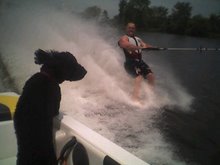Blog Post 2 : Librarians in Second Life
After just popping into Second Life, I have to admit it is just a little scary, although I do maintain the right to change my opinions (and I often do) on just about anything, especially Web 2.0.
Wagner James Au, a real life journalist was hired to become Second Life’s embedded journalist. Besides his blog, New World Notes article, “Taking New World Notes” can also be found in first monday. He claims that Second Life “can understand the conflicts and values of our own material world and for good and ill begin to shape them.” He takes this journalistic role very seriously and sets ethical guidelines in his reporting of Second Life. For examples, he gives no real identities, names, or faces, but does report Second Life experiences impacted by the real world. This includes property disputes, political party coverage, and campaign headquarters. This may be interesting for the next presidential election, Hillary, Obama and John McCain transporting and campaigning in Second Life. I wonder if they will have a virtual election.
Authoritarian governments and battles against terrorist activities are also present in Second Life, and I must say it gets confusing reading about underground terrorist in a virtual society using virtual communications to plot virtual terrorist activities. I just wonder, isn’t the real life world bad enough.
Second Life Herald blogs on news worthy subjects such as world meetings, political ideology of SL residents. Gwyneth Llewelyn blogs from a cultural perspective, while Torley's Second Life & techno music Blog, reports on personal experiences. Tabloid gossip blogs report on the social scene along with the size of female avatar’s feet. Architectural style blogs, Metaverse Architecture and Virtual Suburbia, review designs of virtual buildings.
This is all fascinating, but what does this have to do with Library 2.0?
Book discussions, historical research and reenactments, and even health literacy are now participating in Second Life. Steve Abrams believes SL can help with information literacy. Students creating avatar characters and their environments help them learn to read, understand setting, plot, conflict and character development in novels. Older students have the chance to build an entire native village, fort, historical places of battles. Libraries are reporting more books are checked out that identify the SL back ground stories of the Greek, Roman, and Norse myths of the avatars. He claims as long as it is fun, kids will do research (MultiMedia & Internet @ Schools, 2006).
Alliance Library System in Peoria, Illinois is involved in the creation of a Second Life Library in Second Life and Teen Second Life: a Virtual World for Teens. Even a virtual Academic Second Life Library is being created by the University in Pennsylvania. The Second Life Library owns seven islands of virtual property. Volunteer opportunities are available, librarians wear tags and teleport in Second Life offering to help find resources, answer reference
questions, and give directions. These are not Linded Lab employees, but volunteer librarians from all over the world. I’m not sure how it all operates, but it is encouraging that at least Second Life librarians are teleporting around with Hillary, the fashion police, Homeland Security and terrorist. I still don’t know what to think about all of this, but I will continue to have an open mind.
More information on Second Life Libraries.
Cybrary City - Library Success: A Best Practices Wiki.
Talis Opens Cybrary City in SecondLife - KnowProSE.com

1 comment:
AOL is joining Second Life too. Saw this posting today: http://news.com.com/2110-1026_3-6151999.html?part=rss&tag=2547-1_3-0-20&subj=news
Post a Comment